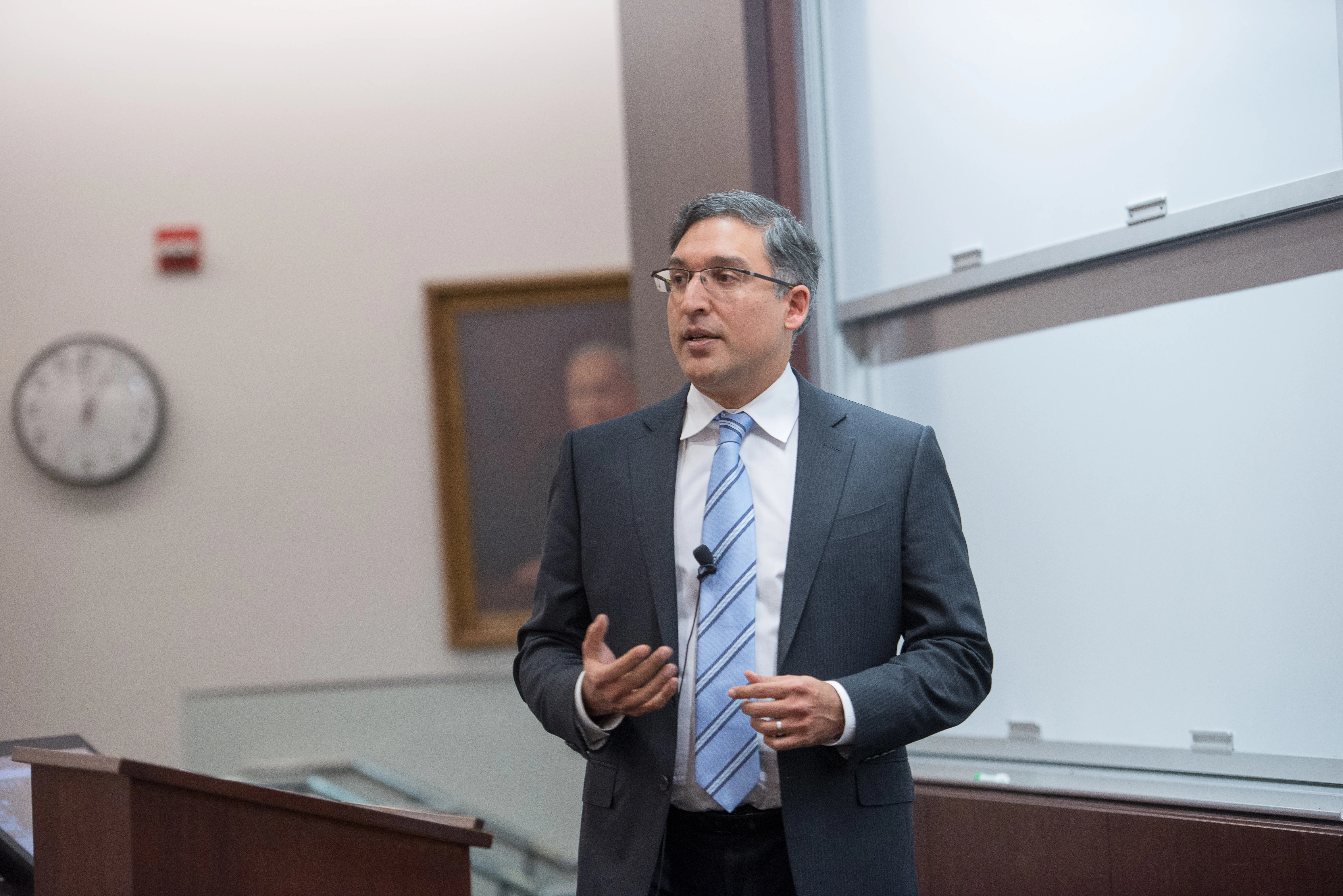“The Law is a Personal Calling”: Former Acting SG Neal Katyal Shares Stories with Law Students

Neal Katyal, who delivered the Ulysses and Marguerite Schwartz Memorial Lecture in November, knows the US Supreme Court better than most.
The professor and appellate lawyer has served as the Acting US Solicitor General, and he’s argued before the Court 37 times—more than any other minority attorney in history, a record previously held by Thurgood Marshall. He argued the “travel ban” case on behalf of the State of Hawaii against President Trump, and more than a decade earlier he successfully challenged the policy of military tribunals at Guantanamo Bay Naval Station, representing Osama bin Laden's chauffeur in Hamdan v. Rumsfeld.
One thing he’s believed from the beginning: America’s founding principles are rooted in a deep and abiding fairness that exists even when the path to justice is long and messy. This is what Katyal, a partner at Hogan Lovells and professor of national security law at Georgetown University Law Center, told University of Chicago Law School students during a packed lunchtime talk that included stories about several Supreme Court cases as well as in insight from his own upbringing as the son of Indian immigrants.
“Our founders knew people weren't angels, that they were going to make mistakes,” he said. “They gave us a system that would find a way to correct [those mistakes].”
This was particularly clear to Katyal during Hamdan, his first argument before the Supreme Court. A young law professor at the time, Katyal had been troubled by the tribunals from the moment they were announced in the wake of the 9/11 terrorist attacks. Soon after, he joined the effort to challenge them. The tribunals lacked congressional approval and, by establishing separate military trials for non-Americans, Katyal said, the White House had created a two-tier system of justice—a “Cadillac version of American justice” for citizens and a “beat-up Chevy version” for foreigners. This, he believed, was a fundamental betrayal of America’s vision.
Which is what he told Hamdan one day at Guantanamo when Hamdan wanted to know why he’d agreed to help defend him.
“I said, ‘You know what? My parents came to this country from another land, from India. And they came here not because of the quality of its soil or its sports teams. They came here for one simple reason, which is they can land on its shores and be treated fairly and have their children treated fairly—maybe not perfectly, but fairly, and better than in any other country on Earth,’” Katyal said. “And I told him that the thing that really bothered me about these military tribunals was [that in all of] in American history, through all of our wars ... we had never [before] set up a trial system in which only foreigners were subject to it.”
Later, after the Court had handed down its 5-3 decision, Katyal learned not only how it felt to win before the highest court in the nation, but what it meant to see America’s founding principles in action.
“You can have in this country a guy who was the lowest of the low, a guy who has conspired with the worst man alive, bin Laden. And he can bring this case, not just against anyone, but against the nation's most powerful man. The world's most powerful man—the president of the United States,” Katyal said. “And he can bring it … in the highest court in the land, the Supreme Court of the United States—and he can win. That's something remarkable about our country.”
Katyal also discussed America’s history with Japanese internment camps during World War II, focusing on a case that preceded Korematsu v. United States, as well sharing some of his experiences arguing the travel ban case. There had been a question then, too, about why he’d gotten involved—this time from his son.
“Daddy, why are you doing this?” his son wanted to know in May 2017, just after Katyal argued Hawaii v. Trump before the US Court of Appeals for the Ninth Circuit. The hearing had been aired live around the world, an unprecedented move that brought a new level of public attention to Katyal.
He didn’t have a perfect response right away. Eventually he decided that the answer, once again, lay in America’s ideals—this time, in its history as a land built by immigrants, and in the idea that the son of Indian immigrants could be where he was, arguing influential cases. In particular, he thought of the country’s de facto motto: e pluribus unum—out of many come one.
During the brief question-and-answer period that followed his talk, Katyal urged students to keep these principles in mind.
“You should never take a case that violates your conscience,” he said. “But you have to make those calls yourself because ultimately, the law is a personal calling.”